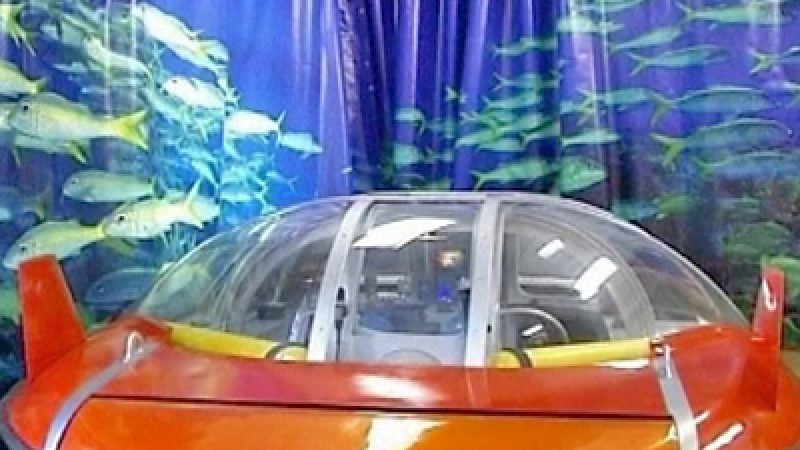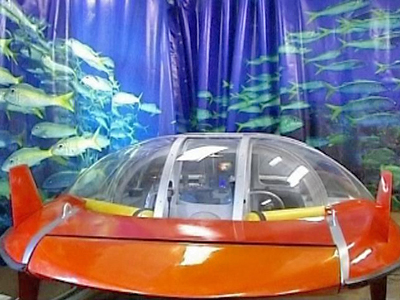
Russian Scientists Invent Pedal-Powered Submarine

Russian engineers have overcome seeming mathematical impossibilities and devised a submarine that glides through the water on pedal-power. The Blue Space is the first man-powered machine capable of generating enough energy to propel the submarine through water.
The submarine is designed for recreational purposes, and is as easy to use as any small recreational boat.
[Vladimir Taradonov, Project Chief, Blue Space]:
„We decided to create a vehicle specifically for private use by underwater tourists. They, as usual, take boat operating courses, buy a car trailer, go to any body of water and ride in the submarine. This is comparable with a fine prestigious automobile, but this is under water.“
The submarine can safely take two passengers deep underwater. Two pedallers sit side-by-side, generating speeds similar to a moderate walking pace.
Because it would be difficult to pedal underwater, the inventors came up with a solution to overcome this obstacle.
They used the principle of the Coanda effect in their design, which is the tendency of a jet of fluid to be attracted to a nearby surface.
The Blue Space uses rotor-jet propellers to take advantage of this effect. The propellers direct an air jet through a flat slot, in a tangential direction, onto the surface of the vehicle, where it adheres and generates thrust.
The submarine is mostly made out of special acrylic glass, making it almost transparent. And Passengers get spectacular underwater views.
Capable of reaching depths of up to 131 feet and staying underwater for up to 4 hours, Blue Space can be used for other purposes such as scientific research, technical inspection of underwater constructions and pipelines, rescuing and security services.
The engineers are now looking for investors to help take the project from prototype to production.
There’s been plenty of international interest from investors in China, South Korea, America and Germany.
 Foto: NTDTV
Foto: NTDTV



























vielen Dank, dass Sie unseren Kommentar-Bereich nutzen.
Bitte verzichten Sie auf Unterstellungen, Schimpfworte, aggressive Formulierungen und Werbe-Links. Solche Kommentare werden wir nicht veröffentlichen. Dies umfasst ebenso abschweifende Kommentare, die keinen konkreten Bezug zum jeweiligen Artikel haben. Viele Kommentare waren bisher schon anregend und auf die Themen bezogen. Wir bitten Sie um eine Qualität, die den Artikeln entspricht, so haben wir alle etwas davon.
Da wir die Verantwortung für jeden veröffentlichten Kommentar tragen, geben wir Kommentare erst nach einer Prüfung frei. Je nach Aufkommen kann es deswegen zu zeitlichen Verzögerungen kommen.
Ihre Epoch Times - Redaktion